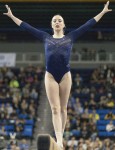Gymnastics is a sport grounded in dazzling aerial displays and sharp, precise turns and leaps – physical feats that would impress even the most athletic of people.
But hidden underneath the spectacle of skill and dance elements is the mental side of the sport not privy to the audience, something that the gymnast has to face every time she needs to take center stage.
“Gymnastics is 90 percent mental and 10 percent physical,” said freshman Mikaela Gerber. “It really is out there a mental game. You have to focus on what you’re doing and not the music, other routines or the crowd. It just becomes what you do.”
The devotion of countless hours spent in a gymnasium repeating drills over and over to develop a rote approach to calling upon skills when it comes time to perform is an integral and necessary part of the sport.
But having the focus, concentration and wherewithal to tap into the hours spent in Yates Gymnasium, where the team practices, is something that could make or break a gymnast’s routine.
“You have the skills and you do the legwork and the training, but it comes down to how you do under pressure and whether you can hit,” said freshman Angi Cipra. “Controlling that is harder than the skills.”
As a 2012 Olympic gold medalist, team manager Jordyn Wieber knows the cerebral side of the game, having been involved in a program that developed her mental skills by teaching her the fundamentals of sports psychology.
Although Wieber is only involved with the Bruins in an administrative role, she has seen a similar emphasis on the psychological side of gymnastics at UCLA that hearkens back to her competitive days.
“Coming to UCLA, it’s really cool that they incorporate all that mental training into our team meetings and our training every day, ” Wieber said.
But in addition to the expected mental conditioning, the team has also included a novel approach to getting the gymnasts mentally prepared for meets. Every once in a while, the team will veer off from their usual practice schedules and split up into two different teams, “Blue” and “Gold.” The challenge they’re assigned next varies from time to time.
Whether it’s to draw names out of a hat and try their best at emulating that person’s floor exercise routine, or even a game of laser tag, it’s always a good chance for the Bruins to take a break from the rigor and demands that come with being elite gymnasts.
But at the same time, splitting into different teams and trying to outdo the other color adds a dash of competition in a cozy environment.
“The main purpose of it is to get their competitiveness flowing,” Wieber said. “Just being with your team every single day can get very comfortable just supporting each other, but it’s very important to be competitive too – that’s the important part of the mental game as well.”
With the NCAA gymnastics championships approaching this weekend, the scrutiny and pressure on the gymnasts can only increase as the spotlight on each performance intensifies.
But the Bruins have had a year full of mental conditioning under their belt to come up with what they need to stay sharp and focused for the final test of this season.
“Just stay as one whole,” Cipra said. “No distractions, outside things, and keep the energy focused on us.”
